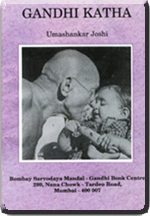
P.O. SEVAGRAM, DIST.WARDHA 442102, MS, INDIA. Phone: 91-7152-284753
FOUNDED BY MAHATMA GANDHI IN 1936

GANDHI KATHA
Written by :Umashankar Joshi
Translated by : Divya Joshi
Table of Contents
- The Miracle of Ramnama
- Equal Care For Everybody
- Motherly Love
- Oneness With Countrymen
- Universe As Family
- Playful Bapu
- The Power of Practice
- Mohan Would Not Steal
- A Lesson for School Children
- The Sportsmanship
- A Lesson Learnt From Mistake
- Its For All!
- Small Thing - Big Lesson
- Saintly Mother
- Unusual Examiner
- The First Satyagrahi
- Nothing is Unimportant
- A Confession
- The Magic of Love
- Always With The Poor
- Practical Approach
- Winning in A Loss
- The Art of Sleeping
- Punctual Bapu
- The First Lesson is Cleanliness
- Smart Kittens
- Ahimsa or Cleanliness ?
- Story Time in Jail
- Bapu - The Host
- The Making of Mahatma
- Ba - The First Satyagrahi
- Heartfelt Sympathy
- Introspective Bapu
- Unflinching Faith
- Firm on Commitment
- An Ordeal for Carelessness
- Self-Suffering
- Self Imposed Discipline
- How I Became Mahatma
- Adans Affection
- A Lesson of Cleanliness
- The Economy at Work
- The Real Friend
- True Ahimsa
- A Lesson for Detachment
- Invaluable Donation
- Anasakti Yoga
- Thinking For Others
- Great Flexibility
- Deep Compassion
- Bapu - The Strategist
- A Novel Leader
- He is Mine !
- Always On Time !
- The Wit of Bapu
- No Security Except God
- No Expensive Fruits For Me !
- The Great Statesman
- Gift For An Opponent
- Be Immortal!
About This Book
Written by :Umashankar Joshi
Translated by : Divya Joshi
First Edition : 3,000 copies, August 2010
Total : 54,000 copies
I.S.B.N :81-7229-095-0
Published by :Bombay Sarvodaya Mandal - Gandhi Book Centre
299 Nana Chowk,
Tardeo Road,
Mumbai 400 007,
MS, India
Navajivan Mudranalaya,
Ahmedabad - 380 014,
India.
Printed by :Jitendra T. Desai
Navajivan Mudranalaya,
Ahemadabad-380014 (INDIA)
© Swati Umashankar Joshi
Download
Chapter-58: The Great Statesman
When Gandhiji went to London to attend the Round Table conference, King George V (also called Pancham George in India) had arranged a dinner party for all members.
The viceroy, Sir Samuel Hoare was worried about inviting Gandhiji. His first worry was, would the king meet such a rebel? And the second was, even if they meet, Gandhiji’s dressing won’t look appropriate at the party. He talked to the King. The King first expressed his anger saying, “What? Why should I invite that rebel Fakir, who has been responsible for the attack on my loyal officers?” After sometime, he again displayed his dislike for that `small man with open knees and without proper dressing.’ But, finally it was decided that, Gandhiji should be invited without putting any condition regarding his dress.
The viceroy had taken charge of presenting Gandhiji at the right moment before the King, at the dinner party hosted by the latter. It was not difficult to identify Gandhiji from the crowd due to his pure white Khaddar clothes. He took Gandhiji to meet the King and introduced. It was a difficult moment. It was not possible for the King to forget Gandhiji’s rebellion. During the last whole year, Gandhiji had launched a powerful Satyagraha movement in India.
But, once they started talking, it all went on quite smoothly. The King was sympathetic and Gandhiji’s manners were also unquestionable. But, during their conversation, when the King’s eyes once set on Gandhiji’s open knees for a moment, his heart started beating rapidly.
Now, their conversation was gradually proceeding towards the end. King George Pancham was quite aware of his responsibility. At the time of farewell, he warned Gandhiji: “Remember, Mr. Gandhi, I won’t tolerate any attack on my empire.”
The viceroy became very tense. It looked like as if the war of words would start or what?
But Gandhiji’s gentleness took the situation under control. He answered, “My Majesty, I should not drag myself into a political dispute with you after having enjoyed the hospitality of my Highness.”
And they took each other’s leave in a friendly atmosphere.
The viceroy was stunned. “How one was a very noble King and the other was the great statesman! The men who are above worldliness, possess the superb worldly manners,” he thought.